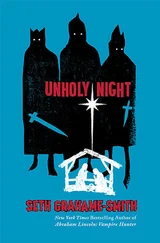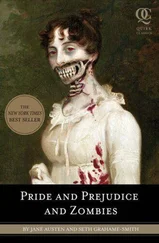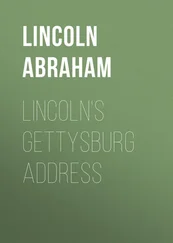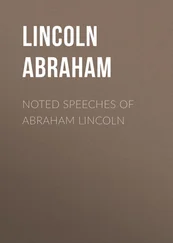It held Abraham’s body by the hair, striking and striking until his forehead finally “caved in like an eggshell.”
“The stranger wrapped his hands around Daddy’s neck and lifted him in the air. I cried out again—sure he meant to strangle the last of him away. Instead he pushed those long thumbnails, those knives, through Daddy’s Adam’s apple and—pop—tore his neck open from the middle. He held his mouth underneath the hole, guzzling like a drunk with a whiskey bottle. Swallowing mouthfuls of blood. When it didn’t come quick enough, he wrapped an arm around Daddy’s chest and hugged him tight. Squeezed his heart till the last ounce was gone—then dropped him in the dirt and turned around. Looked dead at me. Now I understood. Now I knew why Daddy’d been so scared. It had eyes black as coal. Teeth as long and sharp as a wolf’s. The white face of a demon, God strike me down if I lie. My heart thumped away. My breath abandoned me. It stood there with its face covered in Daddy’s blood and it… I swear to you it clutched its hands to its chest and… sang to me.”
It had the earnest, pitch-perfect voice of a young man. An unmistakable English accent.
When griping grief the heart doth wound,
And doleful dumps the mind oppress—
Then music, with her silver sound,
With speedy help doth lend redress. *
That such a sound could come from something so hideous—that its white face could wear such a warm smile—it was all a cruel joke. Its song concluded, the demon gave a long, low bow and ran into the woods. “Ran off till I couldn’t see a trace of white between the trees no more.” Eight-year-old Thomas knelt over his father’s crooked, empty corpse. Every inch of him shook.
“I knew I had to lie. I knew I could never tell a soul what I’d seen, lest they think me a fool, or a liar or worse. What had I seen, anyway? I might have dreamed it for all I knew. When Mordecai came running with the flintlock—when he demanded to know what happened—I broke down crying and told him the only thing I could. The only thing he’d have believed—that it was a Shawnee war party that killed our daddy. I couldn’t tell him the truth. I couldn’t tell him it was a vampire.”
Abe couldn’t speak. He sat across from his drunken father, letting the occasional cracks of burning wood fill the void.
I had listened to hundreds of his stories, some collected from the lives of others, some recounted from his own. But I had never known him to invent one, even in his present state. Frankly I did not think his mind capable. Nor could I think of a sensible reason to lie about such a thing. That left only one unsettling possibility.
“You think I’ve gone round the bend,” said Thomas.
It was precisely what I thought, but I gave no answer. I had learned to keep my mouth closed on such occasions, rather than risk the angry misinterpretation of some innocent remark. I resolved to sit in silence until he sent me away or fell asleep.
“Hell, you’ve got every reason to.”
He took a swallow of last week’s work *and looked at me with a softness I had never seen in him before. Putting everything else aside for the moment and seeing the two of us, not as we were, but as we might have been in some better life. Father and son. That his eyes presently filled with tears both astonished and frightened me. I felt him pleading with me to believe. Yet I could not believe something so foolish. He was a drunk telling a story. That was all.
“I’m telling you because you ought to know. Because you… deserve the truth. I’m telling you that I’ve seen two vampires in my life. The first was in that field. The second…”
Thomas looked away, fighting back tears again.
“The second was named Jack Barts… and I saw him just before your mama died….”
Father had spent the summer of 1817 committing the sin of envy. He’d grown tired of watching his neighbors reap kingly profits by planting wheat and corn on their land. He’d grown tired of breaking his back to build the barns they used to get rich, while sharing in none of the spoils. He felt, for the first time in his life, something like ambition. What he lacked was capital.
Jack Barts was a squat, one-armed man with a taste for expensive clothes and a thriving shipping business in Louisville. He was also one of the few Kentuckians in the business of giving private loans. Thomas had done some work for him as a young man, loading and unloading flatboats on the Ohio River for twenty cents a day. Barts had always treated him kindly and paid him promptly, and when they’d parted company, it had been with a handshake and an open invitation to return. More than twenty years later, in the spring of 1818, Thomas Lincoln took him up on that offer. With his hat in his hands and his head hung low, Thomas sat in Jack Barts’s office and asked for a loan of $75—precisely the amount he needed to buy a plow, a draft horse, seeds, and “everything else one needed to grow wheat, short of sunshine and rain.”
Barts, who looked “hale and hearty as ever in his one-sleeved violet coat,” agreed at once. His conditions were simple: Thomas would return with $90 (the principal plus 20 percent interest) no later than September 1st. Any profits earned above that were his to keep. Twenty percent was more than twice what any respectable bank would’ve charged. But seeing as Thomas didn’t technically own anything (having merely helped himself to his plot at Little Pigeon Creek), he had no collateral—and nowhere else to turn.
Father accepted the terms and went to work felling trees, pulling stumps, plowing sod, and broadcasting seeds. It was grueling labor. In all, he planted seven acres of wheat by hand. If he yielded thirty bushels an acre (a reasonable estimate), he would have enough to pay Barts back, plus a little to get us through winter. Next year he would plant more. The year after that, he would hire a hand to share the work. In five years’ time, we would own the largest farm in the county. In ten years, the state. His last seed sown, father rested and waited for his future to spring from the earth.
But the summer of 1818 proved the hottest and driest in anyone’s memory. When July arrived, there was nary a healthy stalk to be harvested anywhere in Indiana.
Thomas was ruined.
He had no choice but to sell the plow and horse for what little money he could. With no crops to harvest, they weren’t worth much. Too ashamed to face Barts in person, Thomas sent him $28, along with a letter dated September 1st (which he’d dictated to Nancy) promising to send the rest as soon as he could. It was the best he could do. It wasn’t good enough for Jack Barts.
Two weeks later, Thomas Lincoln found himself pleading in whispers, each one visible in the biting night air. He’d been roused from sleep only minutes before. Roused by something brushing against his cheek. The sleeve of a blue silk coat. A handful of bank-notes, $28 in all. The shape of Jack Barts standing over his bed.
Barts hadn’t come all this way to argue, merely to warn. He liked father. He had always liked him. Therefore, he would give him three more days to find the rest of his money. It was business, you see. If word got around that Jack Barts granted special favors to delinquent borrowers, then others might think twice about paying him on time. And where would that leave him? In the poorhouse? No, no. There was nothing remotely personal about it. It was merely a matter of solvency.
They stood by the outhouse, lest their whispers wake anyone in the cabin. Barts asked him one more time: “Can you have my money in three days?” Thomas hung his head again. “I cannot.” Barts smiled and looked away. “Then…”
He turned back. His face was gone—a demon’s in its place. A window into hell. Black eyes and white skin and teeth as long and sharp as a wolf’s God strike me down if I lie.
Читать дальше












